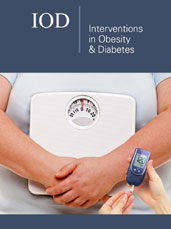- Submissions

Abstract
Interventions in Obesity & Diabetes
Improved Beta-Cell Function and Altered Plasma Levels of GLP-1 During OMTT and Fasting Following Bariatric Surgery in Women with NGT
-
Open or CloseStelia Ntika1,2, Sven Bringman3,4, Per Lundquist4, Linda Tracy2 and Camilla Krizhanovskii1,2*
1Karolinska Institutet, Department of Molecular Medicine and Surgery, Sweden
2Department of Research, Södertälje University Hospital, Sweden
3Karolinska Institutet, Department of Clinical Sciences, Danderyd Hospital, Sweden
4Department of Surgery, Södertälje University Hospital, Sweden
*Corresponding author: Camilla Krizhanovskii, Karolinska Institutet-Södertälje hospital, Department of Research, Lagmansvägen, Sweden
Submission: February 13, 2021Published: March 16, 2021

ISSN : 2578-0263Volume5 Issue1
Abstract
Context: Bariatric surgery can be considered metabolic surgery, with important weight loss-independent effects on metabolism. Altered secretion of the intestinal hormone Glucagon-Like Peptide-1 (GLP-1) may be an important factor in the metabolic success of bariatric surgery. GLP-1 is an important regulator of glucose metabolism, reducing glycemia by regulating insulin and glucagon secretion, slowing gastric emptying, and lowering the desire for food intake. A potentiating effect of bariatric surgery on postprandial GLP-1 secretion is well documented and contributes to the increased insulin secretion and sensitivity that precedes weight loss. However, studies on patients with Normal Glucose Tolerance (NGT) are relatively few, and a clear consensus is still lacking in terms of potential effects of bariatric surgery on fasting GLP-1 levels in obese subjects with NGT.
Objective: To investigate fasting and postprandial levels of GLP-1 in obese women with NGT before and after bariatric surgery.
Design: Plasma GLP-1 was quantified at fasting and during an Oral Meal Tolerance Test (OMTT) in female patients with NGT subjected to Vertical Sleeve Gastrectomy (VSG) or Roux-en-Y Gastric Bypass (RYGB), preoperatively and 3 months postoperatively. Insulin resistance was quantified using HOMA-IR, and beta cell function using the Oral Disposition Index (DIo).
Setting: This study was performed at Karolinska Institutet, Södertälje Hospital south of Stockholm, Sweden.
Patients and participants: Eleven female patients aged 18-65 years with a BMI≥40 kg/m2 and NGT were included. Exclusion criteria were T2D (based on the criteria of the American Diabetes Association (ADA) (2014)), prior GLP-1 based therapy or insulin therapy, and history of substance abuse (drugs or alcohol).
Main outcome measures: Outcome measures were fasting and OMTT plasma levels of insulin and GLP-1.
Results: Fasting GLP-1 levels were decreased 3 months postoperatively compared to baseline (12.3±1.5 vs. 20.1±3.4 pmol/L, p=0.05). Meal-stimulated GLP-1 secretion was significantly increased 3 months postoperatively in association with increased insulin sensitivity and enhanced beta cell function.
Conclusion: Bariatric surgery reduces fasting plasma GLP-1 levels, while significantly increasing meal-stimulated plasma GLP-1 levels, in obese women with NGT.
Keywords:Bariatric surgery; Normal Glucose Tolerance (NGT); Obesity; BMI; Glucagon Like Peptide 1 (GLP-1)
Abbreviations: GLP-1: Glucagon-Like Peptide-1; NGT: Normal Glucose Tolerance; OMTT: Oral Meal Tolerance Test; VSG: Vertical Sleeve Gastrectomy; RYGB: Roux-en-Y Gastric Bypass; T2D: Type 2 Diabetes; IGT: Impaired Glucose Tolerance; ADA: American Diabetes Association
 a Creative Commons Attribution 4.0 International License. Based on a work at www.crimsonpublishers.com.
Best viewed in
a Creative Commons Attribution 4.0 International License. Based on a work at www.crimsonpublishers.com.
Best viewed in 







.jpg)






























 Editorial Board Registrations
Editorial Board Registrations Submit your Article
Submit your Article Refer a Friend
Refer a Friend Advertise With Us
Advertise With Us
.jpg)






.jpg)














.bmp)
.jpg)
.png)
.jpg)










.jpg)






.png)

.png)



.png)






